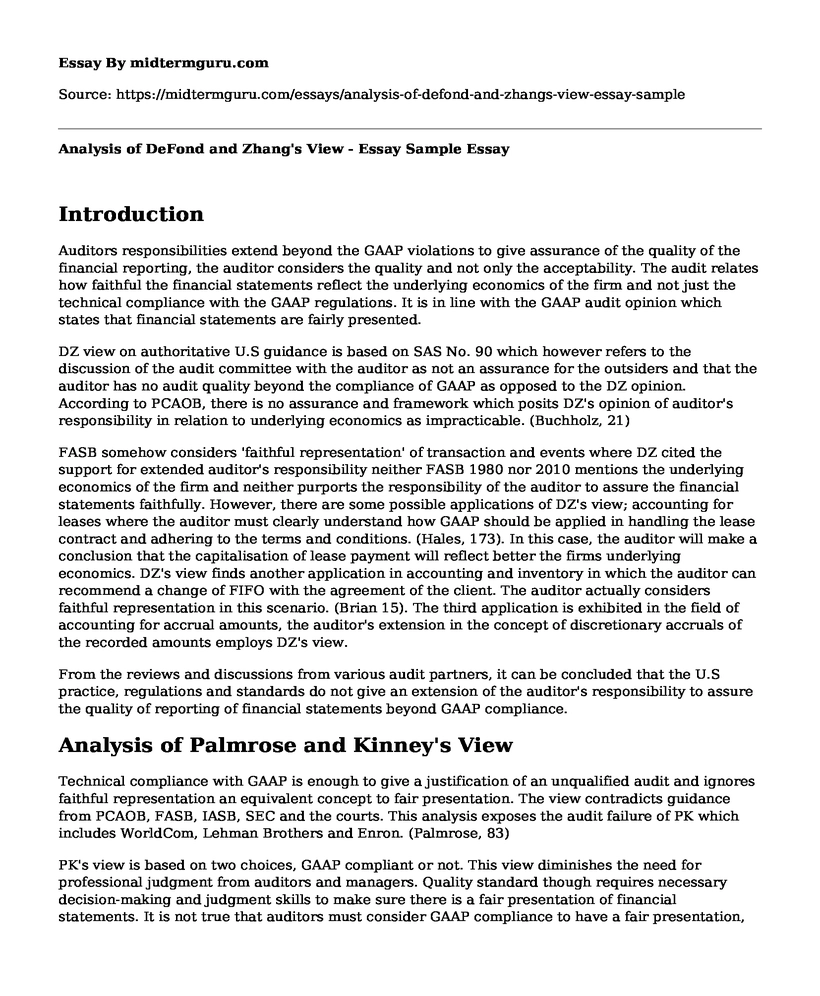Introduction
Auditors responsibilities extend beyond the GAAP violations to give assurance of the quality of the financial reporting, the auditor considers the quality and not only the acceptability. The audit relates how faithful the financial statements reflect the underlying economics of the firm and not just the technical compliance with the GAAP regulations. It is in line with the GAAP audit opinion which states that financial statements are fairly presented.
DZ view on authoritative U.S guidance is based on SAS No. 90 which however refers to the discussion of the audit committee with the auditor as not an assurance for the outsiders and that the auditor has no audit quality beyond the compliance of GAAP as opposed to the DZ opinion. According to PCAOB, there is no assurance and framework which posits DZ's opinion of auditor's responsibility in relation to underlying economics as impracticable. (Buchholz, 21)
FASB somehow considers 'faithful representation' of transaction and events where DZ cited the support for extended auditor's responsibility neither FASB 1980 nor 2010 mentions the underlying economics of the firm and neither purports the responsibility of the auditor to assure the financial statements faithfully. However, there are some possible applications of DZ's view; accounting for leases where the auditor must clearly understand how GAAP should be applied in handling the lease contract and adhering to the terms and conditions. (Hales, 173). In this case, the auditor will make a conclusion that the capitalisation of lease payment will reflect better the firms underlying economics. DZ's view finds another application in accounting and inventory in which the auditor can recommend a change of FIFO with the agreement of the client. The auditor actually considers faithful representation in this scenario. (Brian 15). The third application is exhibited in the field of accounting for accrual amounts, the auditor's extension in the concept of discretionary accruals of the recorded amounts employs DZ's view.
From the reviews and discussions from various audit partners, it can be concluded that the U.S practice, regulations and standards do not give an extension of the auditor's responsibility to assure the quality of reporting of financial statements beyond GAAP compliance.
Analysis of Palmrose and Kinney's View
Technical compliance with GAAP is enough to give a justification of an unqualified audit and ignores faithful representation an equivalent concept to fair presentation. The view contradicts guidance from PCAOB, FASB, IASB, SEC and the courts. This analysis exposes the audit failure of PK which includes WorldCom, Lehman Brothers and Enron. (Palmrose, 83)
PK's view is based on two choices, GAAP compliant or not. This view diminishes the need for professional judgment from auditors and managers. Quality standard though requires necessary decision-making and judgment skills to make sure there is a fair presentation of financial statements. It is not true that auditors must consider GAAP compliance to have a fair presentation, GAAP is just a common principle which always allows auditors to select from an array of alternative methods of accounting which doesn't necessarily guarantee a fair presentation of the financial position of the firm. The auditor has a role in giving assurance that the methods of accounting selected by the management will give a presentation which is fair.
PK's mindset has a proven history of adverse effects. In the Enron case, Arthur's compliance gave accounting choices that didn't explicitly violate GAAP but failed to present the financial condition of Enron fairly. Another case considers Repo 105 where its fraudulent accounting transactions resulted in the litigation which cost Lehman Brothers' auditors. PCAOB posits that there is a common audit deficiency to evaluate the management's accounting choices reasonably even if the choices do not entail an explicit violation of the compliance of GAAP. The court has rendered auditors liable when managers exploit the flexibility in GAAP by opportunistically circumventing a fair presentation.
I actually agree with DeFond and Zhang because PK's criticism is based on two false allegations. He alleges that DZ extends auditor's responsibilities inappropriately beyond the GAAP compliance. This exposes a misunderstanding of two important accounting terms, a fair presentation which is equal to faithful representation according to FASB. DZ uses these terms interchangeably (DeFond, 276). According to DZ, auditors do not assure a faithful representation.
It is not sufficient and necessary to warrant an opinion which is not qualified, this contrasts PK's view of sole compliance to GAAP. Authoritative standards of auditing emphasise the value of fair presentation which includes more than just a provision for assurance of non-explicit violation of the regulations of GAAP. In other words, DZ's view is better than PK's.
References
Buchholz, Alexander, and Chiavelly Nicolas. "Public Company Accounting Oversight Board (PCAOB): Proposed Changes to the Independent Auditor's Report." (2016).
Hales, Jeffrey W., Shankar Venkataraman, and T. Jeffrey Wilks. "Accounting for lease renewal options: The informational effects of a unit of account choices." The Accounting Review 87.1 (2011): 173-197
Daugherty, Brian, and Marshall K. Pitman. "Auditing the auditors: A case on PCAOB inspection reports of registered public accounting firms." Current Issues in Auditing 3.1 (2009): B1-B18.
DeFond, Mark, and Jieying Zhang. "A review of archival auditing research." Journal of Accounting and Economics58.2-3 (2014): 275-326.
Palmrose, Zoe-Vonna, and William R. Kinney Jr. "Auditor and FASB responsibilities for representing underlying economics-What US standards say." Accounting Horizons 32.3 (2018): 83-90.
Cite this page
Analysis of DeFond and Zhang's View - Essay Sample. (2022, Nov 03). Retrieved from https://midtermguru.com/essays/analysis-of-defond-and-zhangs-view-essay-sample
If you are the original author of this essay and no longer wish to have it published on the midtermguru.com website, please click below to request its removal:
- Essay on Insurance Companies and Health Care Organizations
- Critical Analysis of the Static Budget - Report Paper Example
- Business Studies Paper Example: Minimum Share Capital
- Flexible Spending Account - Essay Sample
- Financial Industry Evolves: Digital Banking Revolution - Essay Sample
- Caterpillar Inc.: Audit Risks and Tax Avoidance Issues - Essay Sample
- China's Economic Growth - Essay Sample







